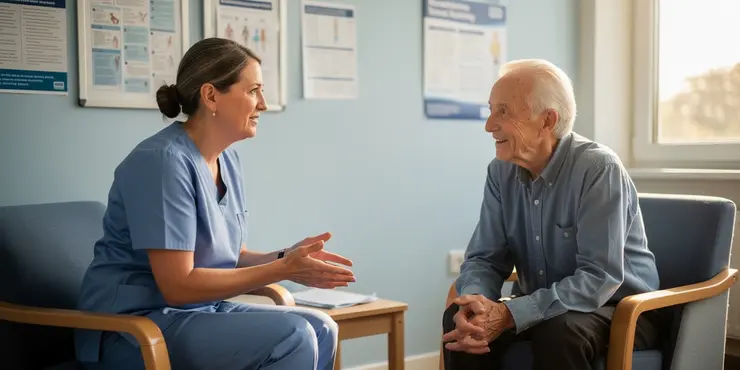
Find Help
More Items From Ergsy search
-
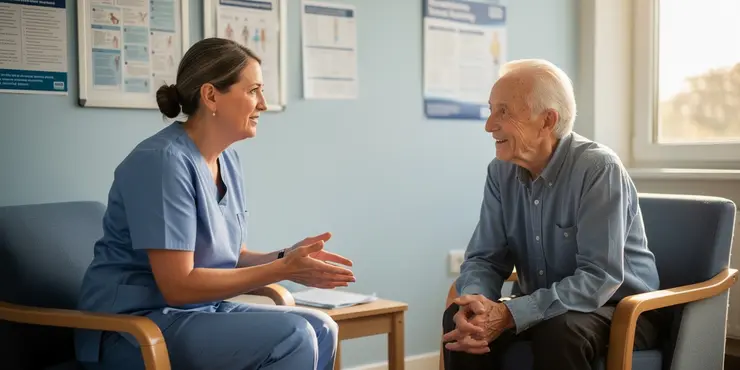
What is Alzheimer's disease?
Relevance: 100%
-

How common is Alzheimer's disease in the UK?
Relevance: 97%
-

What causes Alzheimer's disease?
Relevance: 95%
-

What are the stages of Alzheimer's disease?
Relevance: 95%
-

Can Alzheimer's disease be prevented?
Relevance: 94%
-

What are the symptoms of Alzheimer's disease?
Relevance: 93%
-

How is Alzheimer's disease diagnosed?
Relevance: 92%
-
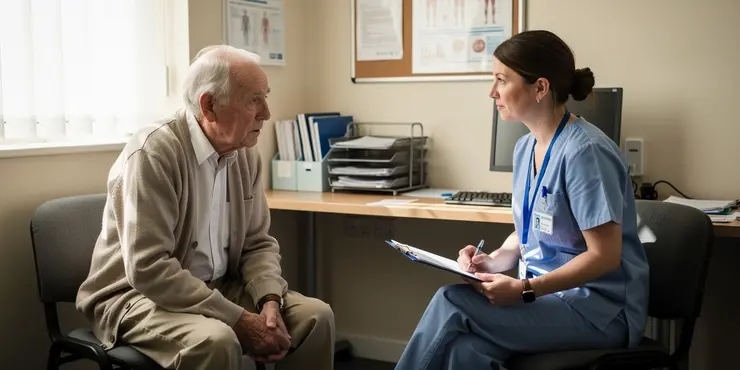
Who is at risk of developing Alzheimer's disease?
Relevance: 92%
-

What treatments are available for Alzheimer's disease?
Relevance: 90%
-
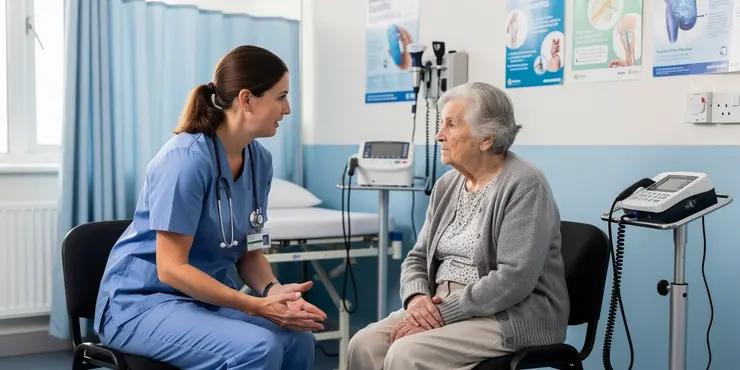
What role does genetics play in Alzheimer's disease?
Relevance: 86%
-

Where can I find information about Alzheimer's disease for carers?
Relevance: 82%
-

How can carers plan for future stages of Alzheimer's disease?
Relevance: 81%
-

How does Alzheimer's affect daily life?
Relevance: 71%
-

Can technology aid in the care of Alzheimer's patients?
Relevance: 67%
-

What support is available for carers of Alzheimer's patients?
Relevance: 65%
-

What online communities exist for carers of people with Alzheimer's?
Relevance: 62%
-

Are there any lifestyle changes that can help reduce the risk of Alzheimer's?
Relevance: 61%
-
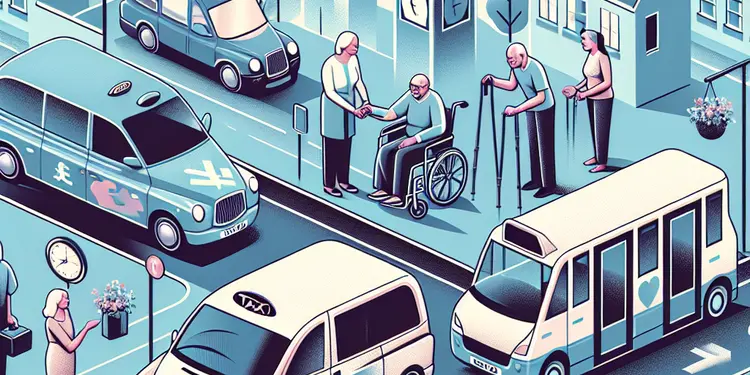
What transportation services are available for Alzheimer's patients and their carers?
Relevance: 61%
-

How can families support a loved one with Alzheimer's?
Relevance: 60%
-

What types of support are available for carers of Alzheimer's patients?
Relevance: 60%
-

How important is self-care for carers of Alzheimer's patients?
Relevance: 59%
-

Are there specific apps or tools to help carers of Alzheimer's patients?
Relevance: 59%
-

What emotional support is available for carers of Alzheimer's patients?
Relevance: 58%
-

Are there financial support programs for carers of Alzheimer's patients?
Relevance: 58%
-

Can carers of Alzheimer's patients access in-home healthcare services?
Relevance: 57%
-

How can support groups benefit carers of Alzheimer's patients?
Relevance: 56%
-

What government assistance is available for carers of Alzheimer's patients?
Relevance: 55%
-

What legal resources are available for carers of Alzheimer's patients?
Relevance: 53%
-

What is the finger prick blood test for Alzheimers?
Relevance: 47%
-

How can carers manage stress while caring for someone with Alzheimer's?
Relevance: 43%
-

Coeliac disease
Relevance: 37%
-
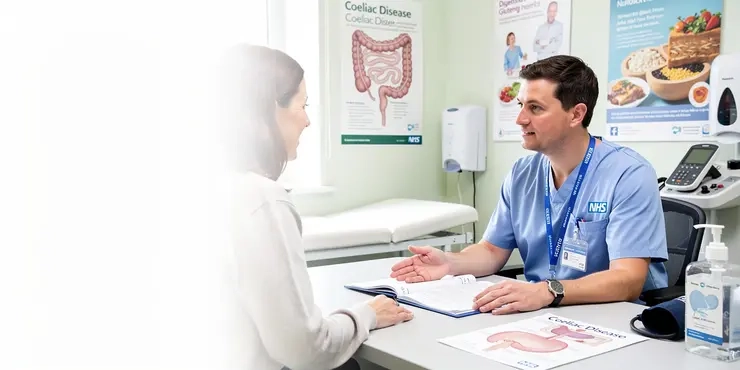
Coeliac Disease: Session 1: What is Coeliac Disease?
Relevance: 37%
-
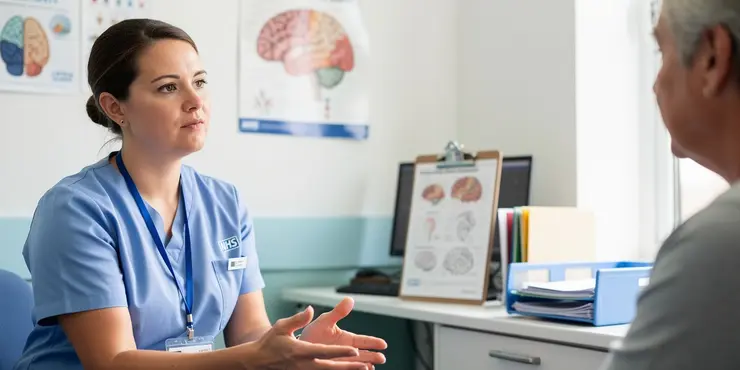
An introduction to frontotemporal dementia (FTD) (part 1/3)
Relevance: 36%
-

What is Lyme Disease?
Relevance: 36%
-

Is Huntington's disease fatal?
Relevance: 35%
-
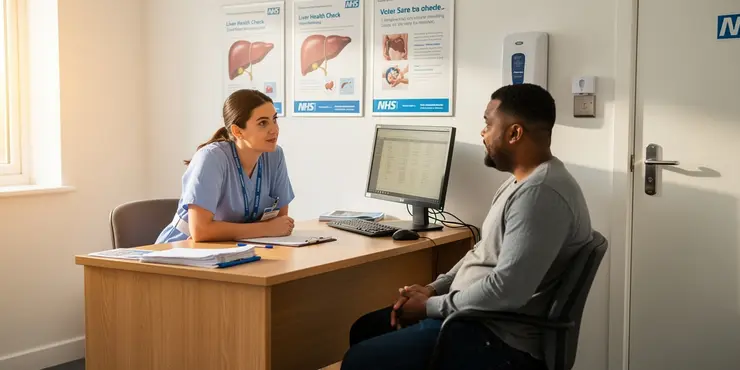
Liver disease | NHS
Relevance: 35%
-
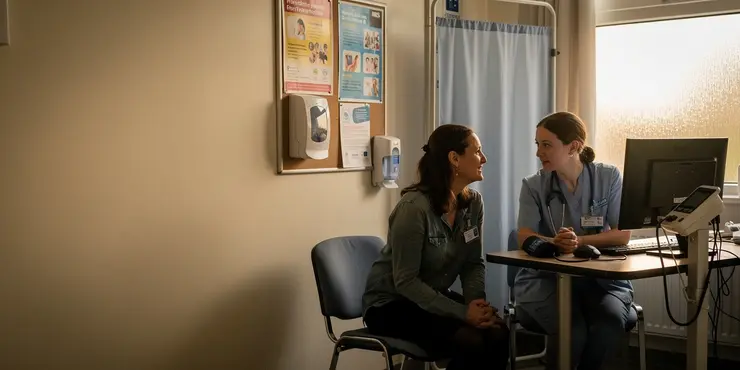
Is Crohn's disease contagious?
Relevance: 35%
-

Causes of coeliac disease
Relevance: 35%
-

What is Huntington's disease?
Relevance: 35%
-

Lyme disease: What is it?
Relevance: 35%
Understanding Alzheimer's Disease
Alzheimer's disease is a progressive neurological disorder that primarily affects older adults. It is the most common cause of dementia, leading to a gradual decline in memory, cognitive abilities, and the capacity to perform everyday tasks. In the United Kingdom, Alzheimer's impacts over half a million people, posing significant challenges for individuals, families, and the healthcare system.
Causes and Risk Factors
Although the exact cause of Alzheimer's disease is not fully understood, it is believed to result from a combination of genetic, environmental, and lifestyle factors. Age is the greatest risk factor, with most cases diagnosed in those over 65. Other risk factors include family history, head injuries, and conditions such as cardiovascular disease and diabetes. Lifestyle factors like diet, exercise, and cognitive engagement may influence the risk of developing Alzheimer's.
Symptoms and Diagnosis
Alzheimer's disease typically begins with subtle memory loss, which gradually worsens over time. Early signs include difficulty recalling recent events, misplacing items, and struggles with problem-solving. As the disease progresses, individuals may experience confusion, language difficulties, and changes in mood or behavior. Diagnosis involves a comprehensive medical assessment, including cognitive tests, medical history, and sometimes brain imaging to rule out other conditions.
Treatment and Management
While there is currently no cure for Alzheimer's disease, various treatments aim to manage symptoms and improve quality of life. Medications such as cholinesterase inhibitors and memantine can help slow cognitive decline in some individuals. Additionally, support from healthcare professionals, carers, and community resources plays a crucial role in managing the disease. Lifestyle interventions, such as a balanced diet, regular physical activity, mental stimulation, and social engagement, can also support brain health.
Support and Resources
Several organizations in the United Kingdom offer support for those affected by Alzheimer's and their families. The Alzheimer's Society provides resources such as helplines, support groups, and educational materials. Local healthcare providers and social services can assist in developing care plans and accessing care services. Encouraging a supportive environment and understanding the challenges faced by individuals with Alzheimer's is vital for providing effective care.
Understanding Alzheimer's Disease
Alzheimer's disease is an illness that affects the brain. It mostly affects older people. It is the main cause of dementia. Dementia makes it hard for people to remember things, think clearly, and do everyday activities. In the UK, more than half a million people have Alzheimer's. It is hard for the people who have it and their families. It also creates challenges for doctors and nurses.
Causes and Risk Factors
Experts do not know exactly what causes Alzheimer's, but they think it is because of genetics, the environment, and lifestyle. The biggest risk factor is age. Most people find out they have it after age 65. Other risk factors include having a family member with the disease, past head injuries, and diseases like heart disease and diabetes. Eating well, exercising, and using your brain can help lower the risk.
Symptoms and Diagnosis
At first, people with Alzheimer's might forget things. They might have trouble remembering recent events, lose items, or find it hard to solve problems. As it gets worse, they may get confused, have trouble talking, or their mood might change. To find out if someone has Alzheimer's, doctors do tests. They check memory, talk about medical history, and sometimes do brain scans.
Treatment and Management
There is no cure for Alzheimer's disease, but there are treatments to make life better. Some medications can help slow down memory loss. Healthcare workers, carers, and community groups are important for helping people with Alzheimer's. Staying healthy by eating a good diet, exercising, keeping the brain active, and being social is important for managing the disease.
Support and Resources
There are many groups in the UK that help people with Alzheimer's and their families. The Alzheimer's Society has helplines, support groups, and information. Local healthcare services can help plan care and provide services. Having a good support system and understanding Alzheimer's helps in taking care of those who have it.
Frequently Asked Questions
What is Alzheimer's disease?
Alzheimer's disease is a progressive neurological disorder that causes brain cells to degenerate and die, leading to a continuous decline in thinking, behavioural and social skills.
What are the symptoms of Alzheimer's disease?
Symptoms include memory loss, confusion, difficulty with language, disorientation, mood and behaviour changes, and challenges with reasoning and judgement.
What causes Alzheimer's disease?
The exact cause is unclear, but it involves a combination of genetic, lifestyle, and environmental factors that affect the brain over time.
How is Alzheimer's disease diagnosed?
Diagnosis typically involves a comprehensive evaluation including medical history, physical exams, neurological tests, and brain imaging to rule out other conditions.
Is there a cure for Alzheimer's disease?
There is currently no cure for Alzheimer's, but treatments are available to temporarily improve symptoms or slow their progression.
Who is at risk of developing Alzheimer's disease?
Risk factors include aging, family history, genetics, and lifestyle factors such as smoking, poor diet, and lack of exercise.
How common is Alzheimer's disease in the UK?
Alzheimer's is the most common form of dementia in the UK, accounting for about 60-80% of dementia cases.
Are there any lifestyle changes that can help reduce the risk of Alzheimer's?
Engaging in regular physical exercise, eating a healthy diet, staying mentally and socially active, and managing cardiovascular risk factors may help reduce the risk.
What are the stages of Alzheimer's disease?
Alzheimer's disease progresses from mild (early stage), to moderate (middle stage), and then to severe (late stage), with symptoms worsening over time.
How does Alzheimer's affect daily life?
Alzheimer's disease impacts daily activities like memory, communication, judgement, and can lead to difficulties with activities such as cooking, driving, or managing finances.
Can Alzheimer's disease be prevented?
There is no guaranteed way to prevent Alzheimer's, but certain lifestyle and health management strategies may lower the risk.
What treatments are available for Alzheimer's disease?
Medications such as cholinesterase inhibitors and memantine might help manage symptoms. Other treatments focus on behavioural therapies and supportive care.
How can families support a loved one with Alzheimer's?
Families can support by creating a safe environment, encouraging social engagement, simplifying tasks, and using memory aids. Caregiver support is also crucial.
What resources are available for Alzheimer's support in the UK?
Resources include Alzheimer's Society UK, NHS memory clinics, support groups, and charities dedicated to dementia care and support.
What role does genetics play in Alzheimer's disease?
Genetics can play a role, especially in early-onset Alzheimer's. However, most cases involve a complex interplay of genetic and environmental factors.
What is Alzheimer's disease?
Alzheimer's disease is an illness. It changes how the brain works. It can make it hard to remember things and think clearly.
People with Alzheimer's may forget names or places. They might get confused easily.
If you or someone you know has trouble with memory, it can be helpful to talk to a doctor.
To help people remember, you can write things down or use a planner. Picture books or photo albums can also be nice to look at together.
Alzheimer's disease is a brain illness. It gets worse over time. It makes brain cells sick and die. This affects how you think and act. It also changes how you get along with others.
What are the signs of Alzheimer's disease?
Alzheimer's disease makes people forget things. Here are some signs to look out for:
- Having trouble remembering names or events
- Getting lost in familiar places
- Forgetting how to do everyday tasks
- Repeating questions or stories
- Changes in mood or behavior
If you notice these signs, talk to a doctor. A doctor can help.
Tools like picture cards or memory games can help. Ask family and friends for support.
Signs include forgetting things, feeling mixed up, having trouble speaking, getting lost, feeling grumpy or sad, and having a hard time thinking clearly.
What makes Alzheimer's disease happen?
Doctors are not sure about everything that causes Alzheimer's. It is a disease in the brain. It makes it hard to remember things and think clearly.
Here are some things that might cause it:
- Being older. Most people who get it are over 65.
- Family history. If someone in your family has it, you might get it too.
- Changes in the brain. These might be tiny clumps called plaques and tangles.
If you or someone you know is worried, talk to a doctor. They can help.
Pictures or videos can also help you understand better.
We do not know the exact cause. But it happens because of things like your genes, how you live, and the world around you. These things change the brain over time.
How do doctors find out if someone has Alzheimer's?
To find out what is wrong, doctors do a full check-up. They ask about your health before, do body check-ups, and may do special brain tests. This helps them see if something else might be causing the problem.
Can doctors make Alzheimer's disease go away?
Right now, there is no cure for Alzheimer's disease. But, there are treatments that can help make the symptoms better for a while or slow down how fast they get worse.
Who can get Alzheimer's disease?
Some people have a higher chance of getting Alzheimer's disease. Here are some things that can make the chance higher:
- Being older. People over 65 have a higher chance.
- If someone in your family has had Alzheimer's, you might have a higher chance too.
- Certain genes can make the chance higher.
- Health problems, like high blood pressure or diabetes, can increase the chance.
To help with understanding, looking at pictures, using simple words, or asking someone for help can be useful. You can also use tools like text-to-speech to listen to information.
Things that can make it more likely to happen are getting older, having family members who had it, genes you get from your parents, and the way you live. This includes things like smoking, eating unhealthy foods, and not exercising.
How many people in the UK have Alzheimer's disease?
Alzheimer's is a sickness that affects the brain. It makes people forget things and can make life hard. In the UK, many people have Alzheimer's. It's not rare.
If you want help to learn more, you can:
- Ask a teacher or parent to explain.
- Use picture books about Alzheimer's.
- Watch videos made for kids.
Alzheimer's is a type of illness that makes it hard for people to remember things and affects their brains. In the UK, it is the most common type of this illness, happening in about 60-80 out of every 100 people who have memory problems.
Here are some tools that can help:
- Pictures or photo albums to help remember people and events.
- Simple reminder notes for daily tasks.
- Electronic helpers like talking clocks or alarms for reminders.
Talking with a friend or family member can also support understanding and remembering.
Can changing the way you live help you not get Alzheimer's?
Changing how you live can help your brain stay healthy. Here are some things you can try:
- Exercise: Moving your body is good for your brain. Try a little exercise each day, like walking or dancing.
- Healthy Eating: Eat lots of fruits, veggies, and whole grains to keep your brain strong.
- Sleep: Get enough sleep to help your brain rest and repair.
- Stay Social: Spend time with friends and family to keep your mind active.
- Learn New Things: Try puzzles or learn something new, like a hobby, to keep your brain busy.
If you find it hard to understand these changes, ask someone to help. They can explain and try the changes with you.
Doing exercise often, eating good food, keeping your mind busy, spending time with friends, and taking care of your heart can help keep you healthy.
What Happens in Alzheimer's Disease?
Alzheimer's disease gets worse over time. It starts with mild problems (early stage), then gets a bit worse (middle stage), and finally becomes very bad (late stage). The problems get worse as time goes by.
What happens in daily life when someone has Alzheimer's?
Alzheimer's is an illness that makes it hard to remember things. It can make simple jobs like getting dressed or cooking hard to do.
People with Alzheimer's might forget where they put things. They might also forget names of people they know.
They can feel confused about where they are. They might also forget what day it is.
Sometimes they need help from family and friends. People can help by being patient and offering support.
Using a calendar to track days and writing notes to remember tasks can help.
Alzheimer's disease makes daily activities harder. It can affect how well you remember things, talk to people, and make decisions. It can make things like cooking, driving, or handling money tricky.
Can we stop Alzheimer's disease?
Alzheimer's disease is a kind of illness that affects the brain. Scientists are still trying to understand it fully.
Right now, we don't know how to completely stop Alzheimer's disease. But there are things we can do to make our brain healthier:
- Eat healthy food like fruits and vegetables.
- Exercise regularly and stay active.
- Play games or do puzzles to keep your mind busy.
- Get enough sleep each night.
- Talk to friends and family and stay social.
These activities can help your brain stay strong, but they won't completely prevent the disease. It's always a good idea to talk with a doctor for more advice.
We can't stop Alzheimer's for sure, but doing some things might help keep it away.
What can help people with Alzheimer's disease?
Here are some ways to help people with Alzheimer's:
- Medicine: Doctors can give medicine to help with memory and thinking.
- Healthy Habits: Eating good food and exercising can help.
- Mind Games: Playing games and puzzles can keep the brain active.
- Support: Talking to friends, family, or joining a support group can be helpful.
Remember, everyone is different, so it’s good to talk to a doctor about what's best for each person. Using reminders like notes or alarms can also help with daily tasks.
Some medicines can help, like cholinesterase inhibitors and memantine. They make symptoms better. Other treatments help with behavior and give support.
How can families help someone with Alzheimer's?
Families can do many things to help someone with Alzheimer's. Here are a few ways:
- Be Patient: Talk clearly and take time to listen.
- Create a Routine: Do things at the same time each day.
- Help with Tasks: Assist with daily tasks like dressing or eating.
- Use Simple Words: Speak with easy words and short sentences.
- Make a Safe Home: Remove things that can cause falls or accidents.
- Look for Support: Join groups for families of Alzheimer's patients.
These steps can make life better for both your loved one and your family.
Families can help by making a safe place, spending time with others, making jobs simpler, and using tools to remember things. It's also important for caregivers to get help.
What help is there for people with Alzheimer's in the UK?
If you or someone you know has Alzheimer's, there is help. Here are some things that can help:
- Talking to the Doctor: They can give advice and medicine.
- Alzheimer's Society: They have a phone line and website for help.
- Memory Cafés: Places where people can meet, talk, and make friends.
- Support Groups: Meet with other people who know about Alzheimer's.
- Carer Support: Help for people who take care of others with Alzheimer's.
Ask for help if you need it. You are not alone.
Here are some places that can help:
- Alzheimer's Society UK.
- NHS memory clinics.
- Support groups.
- Charities that help people with dementia.
How do genes affect Alzheimer's disease?
Genes are like instructions in our bodies.
Sometimes, these instructions can make it more likely for someone to get Alzheimer's disease, which is a sickness that affects the brain.
Not everyone with these genes will get the disease, but they can increase the risk.
Talking to a doctor can help you understand more.
Using simple pictures and videos might also help explain this better.
Genes can be important, especially if someone gets Alzheimer's when they are young. But usually, Alzheimer's happens because of a mix of genes and things around us, like what we eat or do each day.
Useful Links
This website offers general information and is not a substitute for professional advice.
Always seek guidance from qualified professionals.
If you have any medical concerns or need urgent help, contact a healthcare professional or emergency services immediately.
Some of this content was generated with AI assistance. We’ve done our best to keep it accurate, helpful, and human-friendly.
- Ergsy carfully checks the information in the videos we provide here.
- Videos shown by Youtube after a video has completed, have NOT been reviewed by ERGSY.
- To view, click the arrow in centre of video.
- Most of the videos you find here will have subtitles and/or closed captions available.
- You may need to turn these on, and choose your preferred language.
- Go to the video you'd like to watch.
- If closed captions (CC) are available, settings will be visible on the bottom right of the video player.
- To turn on Captions, click settings .
- To turn off Captions, click settings again.
More Items From Ergsy search
-

What is Alzheimer's disease?
Relevance: 100%
-

How common is Alzheimer's disease in the UK?
Relevance: 97%
-

What causes Alzheimer's disease?
Relevance: 95%
-

What are the stages of Alzheimer's disease?
Relevance: 95%
-

Can Alzheimer's disease be prevented?
Relevance: 94%
-

What are the symptoms of Alzheimer's disease?
Relevance: 93%
-

How is Alzheimer's disease diagnosed?
Relevance: 92%
-

Who is at risk of developing Alzheimer's disease?
Relevance: 92%
-

What treatments are available for Alzheimer's disease?
Relevance: 90%
-

What role does genetics play in Alzheimer's disease?
Relevance: 86%
-

Where can I find information about Alzheimer's disease for carers?
Relevance: 82%
-

How can carers plan for future stages of Alzheimer's disease?
Relevance: 81%
-

How does Alzheimer's affect daily life?
Relevance: 71%
-

Can technology aid in the care of Alzheimer's patients?
Relevance: 67%
-

What support is available for carers of Alzheimer's patients?
Relevance: 65%
-

What online communities exist for carers of people with Alzheimer's?
Relevance: 62%
-

Are there any lifestyle changes that can help reduce the risk of Alzheimer's?
Relevance: 61%
-

What transportation services are available for Alzheimer's patients and their carers?
Relevance: 61%
-

How can families support a loved one with Alzheimer's?
Relevance: 60%
-

What types of support are available for carers of Alzheimer's patients?
Relevance: 60%
-

How important is self-care for carers of Alzheimer's patients?
Relevance: 59%
-

Are there specific apps or tools to help carers of Alzheimer's patients?
Relevance: 59%
-

What emotional support is available for carers of Alzheimer's patients?
Relevance: 58%
-

Are there financial support programs for carers of Alzheimer's patients?
Relevance: 58%
-

Can carers of Alzheimer's patients access in-home healthcare services?
Relevance: 57%
-

How can support groups benefit carers of Alzheimer's patients?
Relevance: 56%
-

What government assistance is available for carers of Alzheimer's patients?
Relevance: 55%
-

What legal resources are available for carers of Alzheimer's patients?
Relevance: 53%
-

What is the finger prick blood test for Alzheimers?
Relevance: 47%
-

How can carers manage stress while caring for someone with Alzheimer's?
Relevance: 43%
-

Coeliac disease
Relevance: 37%
-

Coeliac Disease: Session 1: What is Coeliac Disease?
Relevance: 37%
-

An introduction to frontotemporal dementia (FTD) (part 1/3)
Relevance: 36%
-

What is Lyme Disease?
Relevance: 36%
-

Is Huntington's disease fatal?
Relevance: 35%
-

Liver disease | NHS
Relevance: 35%
-

Is Crohn's disease contagious?
Relevance: 35%
-

Causes of coeliac disease
Relevance: 35%
-

What is Huntington's disease?
Relevance: 35%
-

Lyme disease: What is it?
Relevance: 35%


